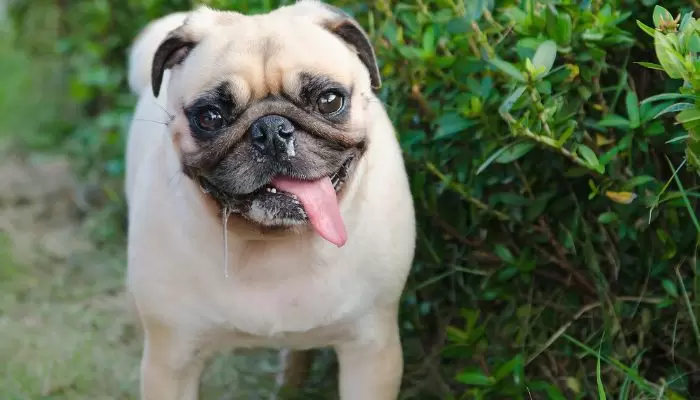
If you are unfortunate enough to swallow dog saliva, there is a good chance that the substance will cause you serious health problems.
The enzymes in dog saliva can break down important nutrients in your stomach and intestines, leading to nausea, vomiting, diarrhea, and even death. If you suspect that you have ingested dog saliva, seek immediate medical attention.
Table of Contents
How to Avoid Dog Saliva Ingestion
Avoiding dog saliva ingestion is simple — keep your dog on a leash at all times and do not allow them access to other animals or children. do not let your dog lick you or kiss other people. be especially careful when walking your dog in public places.
Do not allow them to lick other dogs too. do not allow your dog to drink fluids from bottles that you have opened, unless they are specifically designed for pets.
Is Dog Saliva A Poison To Humans?

A lot of dog owners will tell you that their dog’s saliva is nothing to worry about, but a recent study has shown that there may be some truth to the old wives’ tale that dog saliva is poisonous to humans.
The study found that when human cells were exposed to dog saliva, they died within 24 hours. While further research is needed to determine the exact cause of the cell death, it’s possible that the bacteria in dog saliva may be responsible.
Is It Safe To Eat Dog Saliva?
There is a lot of debate over whether or not it is safe to eat dog saliva. Some people believe that the enzymes in a dog’s saliva can help digest food, while others believe that it can be dangerous to consume.
There have been no scientific studies conducted on the safety of eating dog saliva, so there is no real evidence either way. However, there are a few things to consider before deciding whether or not to eat it. First of all, dogs often lick their wounds and eat other animals, so their saliva could potentially contain harmful bacteria.
Furthermore, many people are allergic to dog saliva, so eating it could cause an allergic reaction. Overall, there is no conclusive evidence that eating dog saliva is safe or unsafe, so it is ultimately up to each individual to decide what they feel comfortable doing.
Can Dog Saliva Make You Sick?
It’s no secret that dogs love to lick their owners – and sometimes, even strangers. But what many people don’t know is that dog saliva can contain harmful bacteria that may cause sickness. In fact, a recent study showed that nearly one-third of people who were surveyed had been sickened by dog saliva at some point in their lives.
While not all cases of illness are caused by exposure to dog saliva, it’s important to be aware of the risks associated with it.
Is Dog Saliva Harmful For Human Health?
There is a lot of discussion on the internet about whether or not dog saliva is harmful to human health. Some people say that it can cause serious health problems, while others claim that it is no more dangerous than any other type of saliva.
Here we will explore the potential dangers of dog saliva and investigate whether or not it truly poses a threat to human health. Some of the potential dangers that can be caused by dog saliva.
Can You Get Rabies From Swallowing Saliva?
In the United States, rabies is a disease that is most commonly associated with wild animals such as raccoons, skunks, and bats. However, it is also possible to get rabies from other sources, including from saliva.
Rabies is a serious and deadly disease, but it can be prevented by getting vaccinated against it.
Is Dog Saliva Good For Your Wounds?
Dogs are known for being loyal and friendly creatures. They are also known for their drool. In fact, many people believe that dog saliva has healing properties and can be used to help treat wounds. But is this true? Does dog saliva really have any benefits?
There is some evidence that suggests dog saliva may help to heal wounds. One study found that when dog saliva was applied to skin wounds in rats, the rate of healing was significantly faster than when the wounds were not treated with dog saliva. Additionally, another study found that when human patients were treated with a product containing dog saliva, their wound healing time was significantly shorter than those who were not treated with the product.
While these studies provide some evidence that dog saliva may have benefits for wound healing, more research is needed in order to make a definitive conclusion.
What Happens If I Eat Dog Saliva?
You may have heard that eating dog saliva can be good for you, but is this actually true? Can consuming canine spit really improve your health, or is this just an old wives’ tale? here, we’ll take a look at what science has to say about the health benefits of eating dog saliva.
Dogs do not bite humans, so it is unlikely that dog saliva will harm you. However, the chances of contracting a disease from a dog are fairly low. Still, there are a few diseases that can be spread from dog to human and these include: Rabies – this is a virus that affects the brain and nervous system.
It is passed from an infected animal to humans through the bite of another animal. It can cause a number of symptoms including paralysis, headache, fever and hallucinations.
What happens If Dog Saliva Gets In Your Mouth?
Your dog may be licking your face and you may be thinking it’s cute, but have you ever wondered what happens if dog saliva gets in your mouth? It turns out that there are some risks associated with it.
Dog saliva can contain bacteria, viruses, and parasites that can make you sick. Some of these diseases can be serious, even life-threatening. Some of the bacteria found in dog saliva are: Staphylococcus aureus, Streptococcus spp., and E. coli. Dog saliva can also contain the bacteria that cause rabies and canine distemper.
About three to six days after a dog bite, the incubation period for these diseases ranges from two weeks to one year, so it is important to get treatment as soon as possible.
Can Rabies Be Transmitted By Touching the dog?
Rabies is a deadly virus that can be transmitted through the bite of an infected animal. It can also be transmitted if the saliva or nerve tissue of an infected animal comes into contact with broken skin or mucous membranes. While it is most commonly spread through bites, there have been cases of rabies being transmitted by touching dogs. In order to protect yourself from rabies, it is important to get vaccinated and to avoid contact with stray or feral animals.
Can You Get Rabies From Dog’s Saliva?
There is some debate over whether or not you can get rabies from a dog’s saliva. Some people say that as long as the saliva does not enter your bloodstream, you are safe. Others argue that any contact with the saliva can put you at risk for rabies. The truth is that no one really knows for sure how the virus is transmitted, but it is generally agreed that if a dog has rabies, it is best to stay away from its saliva.
Dog saliva (dog kisses) may transfer bacteria to humans
A new study suggests that dog saliva may transfer bacteria to humans. The study, conducted by researchers at the University of California, found that when dogs lick their owners, they may leave behind bacteria that can cause human illness. The research team collected saliva samples from dogs and their owners and analyzed them for the presence of harmful bacteria. They found that about a third of the dogs had harmful bacteria in their saliva, and that some of these bacteria were also present in the saliva of their owners. The study authors say that the findings underscore the importance of hygiene, especially when it comes to petting or kissing dogs.
You can get hookworms and other parasites from dog saliva
Dogs may be man’s best friend, but they can also transmit some nasty parasites. A new study published in the journal Emerging Infectious Diseases warns that hookworms and other parasites can be transmitted from dog saliva. The study found that 41 percent of people who allowed their dogs to lick them on the face or mouth had evidence of parasites in their saliva. While the risk of contracting a parasite from a dog lick is low, it’s important to be aware of the potential danger.
Dog saliva helps prevent canine cavities
Saliva helps dogs with digestion, but not in the way you think
Excessive saliva in dogs can be a sign of tons of issues
Dogs are susceptible to dental cavities and gum disease, just like humans. But unlike humans, dogs rely on their owners to keep their teeth clean. Dog saliva contains enzymes that help break down food and bacteria, which helps prevent canine cavities.
Dog owners should brush their dog’s teeth at least once a week using a toothbrush and toothpaste made for dogs. There are also special water additives and chew toys that can help keep your dog’s teeth clean.
Final Verdict – What Happens If You Swallow Dog Saliva
When it comes to dog saliva, there are two things you need to know: It’s not good for you, and your dog probably doesn’t care. Ingesting dog saliva can transmit harmful bacteria and parasites, including rabies and Giardia. And while your dog’s slobber might make you gag, it’s unlikely to cause any long-term health problems. But if you are worried about swallowing dog saliva, there is a way to get the DNA out of it. And it doesn’t involve drinking your dog’s spit.
